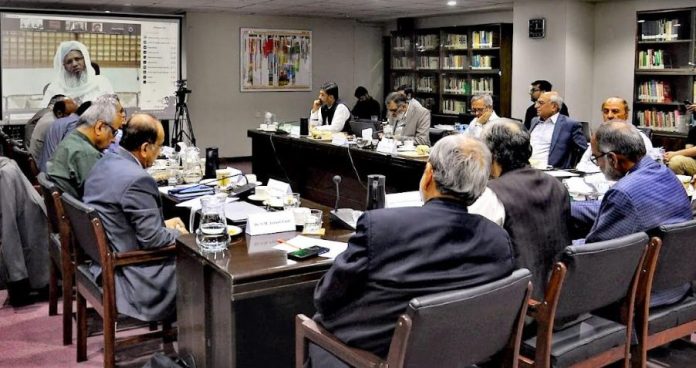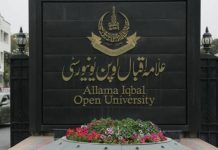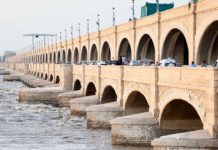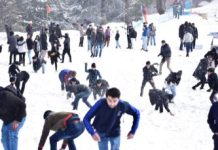DNA
Islamabad, Mar 12: Renowned intellectuals, technocrats, religious scholars and academics representing a cross-section of Pakistani society gathered for a special moot of the National Academic Council of Institute of Policy Studies (IPS) to contemplate measures to mitigate the ongoing national crisis, what they termed as extremely complex, multidimensional and unprecedented since the country’s independence.
The veterans suggested launching of a strong, indigenous, civil society, nationwide struggle to help pull the country out of the morass within the constitutional framework.
They described the ongoing situation a systemic failure whose root cause was moral crisis, corruption and institutional decay.
As such the experts recommended imposition of a ‘governance emergency’, which they said, was more critical than an economic or security emergency.
The speakers also underscored the importance of proper education of youth and the new generation to make them productive citizens and viewed that the continuously deteriorating political crisis demands holistic democratic, electoral, and holistic structural reforms. Moreover, there was a dire need to devise a state-of-the-art political system on realistic and pragmatic foundations to promote credible and competent leadership which can address the lack of dialogue and the knowing-doing gap, they urged.
Speaking on the occasion, Khalid Rahman, IPS’ chairman, called for the mobilization of Pakistan’s indigenous civil society, with the inclusion of all stakeholders, that can bring consensus and clarity of ideas, and devise out-of-the-box solutions to mitigate the perpetual crisis. He also proposed the system of proportionate electorate to ensure representative democracy and good governance in the country.
Dr. Shahida Wizarat, eminent economist and author, said Pakistan has long relied on external actors, especially IMF and the World Bank, for economic support, which then dictated the country’s policies and developed the nation’s consumer mindset.
The foremost thing to troubleshoot the economic crisis is to eliminate foreign economic managers in favor of indigenous solutions and seek alternatives to IMF, she remarked.
Just as strength is needed for the creation of a state, it is needed for its stability too, stressed Mufti Abdul Rahim, head, Jamia-tur-Rasheed, Karachi, suggesting that in the current situation, the strength must be drawn from within by forging a consensus, documenting true facts, constructively criticizing the institutions including establishment, streamlining media, and empowering the role of religious institutions and faith-based initiatives.
Along with introducing democratic, electoral, and governance reforms, efforts are needed to ensure check and balance, accountability, and the functionality of all state institutions, stressed Senator (r) Javed Jabbar, former federal minister and public intellectual. Moreover, there is a need of a new management paradigm based on enhancing the functionality of governance structures through measures such as the integration of local governance units at the national level, he stressed.
The hybrid national moot was also addressed by Dr. Qibla Ayaz, chairman, Council of Islamic Ideology, Ahmad Bilal Mehboob, founder president, PILDAT, Mufti Muneeb-ur-Rahman, president, Tanzeem-ul-Madaris Ahle Sunnat Pakistan, Muhammad Akram Sheikh, eminent jurist, Dr. Syed Irfan Haider, vice-chancellor, Ziauddin University, Syed Abu Ahmad Akif, former federal cabinet secretary, Dr Anwar-ul-Hassan Gilani, former vice chancellor, University of Haripur, Dr Junaid Ahmed Zaidi, former rector COMSATS, Dr Syed Tahir Hijazi, former member governance, Planning Commission of Pakistan, Waqar Masood Khan, former federal secretary (finance), Mirza Hamid Hassan, former federal secretary, Water and Power, Ambassador (r) Syed Abrar Hussain, vice chairman, IPS, Prof. Jaleel Aali, prominent intellectual and former head, Urdu department, F.G. Sir Syed College, Dr. Naveed Butt, physician, Federal Government Services Hospital, Nazeer Ahmad Mahar, governance specialist and executive director, The Research Initiative, Dr. Fakhrul Islam, director Pakistan Study Centre, Peshawar University, Brig. Tughral Yamin, former dean CIPS, NUST, Dr. Masood Mehmood Khan, faculty at Curtin University, Australia, Dr. Noreen Saher, associate professor/chairperson, Department of Anthropology, IIUI, and Shahzad Iqbal Sham, senior research fellow IPS.
The moot participants demanded the formation of a ‘truth and reconciliation forum’, on the lines of the South African model, as a viable national cathartic measure. Another suggested alternative was a ‘qaumi jirga’ to develop a national consensus. This is important because innovative solutions can emerge only when discussed extensively by stakeholders.
It was rued that although it is a fact that Pakistan was faced with multidimensional, i.e. economic, social, political challenges, the perception is largely amplified and managed by external elements that want to weaken the country, internally and externally. The citizens must realize that Pakistan has its own elements of strength and national confidence that can bring durable improvements. The situation must not lead to despair and pessimism; instead, the vision for change and solutions must be accompanied by self-esteem, unwavering fight, and persistent efforts at every possible level.
In this regard, the example of Iran was quoted as a model of resilience and indigenization. Some 30 years ago Turkey was the top country for scientific output in the Muslim world, but now Iran enjoys that position in spite of years’ long crushing international sanctions.
The need of the hour is that the politicians should sit together and develop a consensus on minimum agenda, a charter of national reconciliation, and true democracy as the solution. The solution to the institutional crisis lies in self-reliance, electoral and governance reforms, promotion of accountability, morality, and digitalizing the system, the moot concluded.












